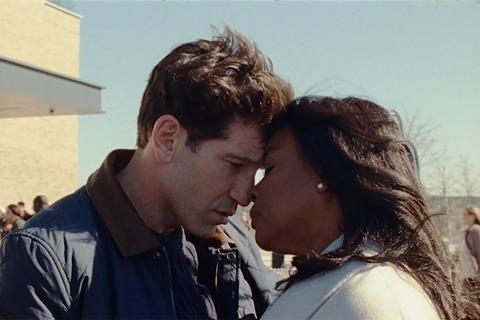Ava DuVernay’s docu-drama about caste is ambitious in its scope but unwieldy in its execution

Dir. Ava DuVernay. US. 2023. 139 mins.
Few recent reality-based features have been quite as ambitious or as urgently intentioned as Ava DuVernay’s Origin, the story of an author’s mission to shed new light on the history of racism. But this docudrama, recounting the background to Isabel Wilkerson’s acclaimed 2020 study ’Caste’, is an unwieldy, fragmented hybrid that comes across very much as an educational project, never quite gelling as narrative. Imposing performances from a cast headed by Aunjanue Ellis-Taylor (Oscar-nominated for 2021’s King Richard) and some grand-scale historical evocations show the energetic maestria of the Selma director, but although Origin may figure strongly in the awards season after its Venice debut, it comes across more as a scholarly-minded introduction to Wilkerson’s achievement than a satisfying drama.
Never quite gels as a narrative
As the film begins, journalist Wilkerson has already won a Pulitzer for her book ’The Warmth Of Other Suns’; DuVernay goes on to sketch the genesis of her follow-up ’Caste: The Origins Of Our Discontent’. At a reception, Wilkerson is approached by a magazine editor (Blair Underwood) to write about the killing of black teenager Treyvon Martin in Florida in 2016. She declines, but Martin’s death, depicted in early scenes, followed a year later by the white supremacist rally in Charlottesville, Virginia, spark Wilkerson’s sense of a connection between these events. She also relates them to the experiences of African-American anthropologists Allison and Elizabeth Davis, who witnessed a Nazi book-burning in early 30s Berlin; the couple later undertook an undercover project in Mississippi to investigate racism, an episode also dramatised here.
Pursuing her idea, the writer visits Berlin, then Delhi, where scholar Dr. Suraj Yengde, playing himself, fills her in on the historical oppression of the Dalit caste - formerly referred to as ‘untouchables’ - and the struggles of Dalit political leader Bhimrao Ambedkar. Wilkerson also gleans stories closer to home, notably an instance of entrenched racism experienced by her friend Miss Hale - an anecdote delivered magnetically by Audra McDonald.
DuVernay intersperses these sequences with her heroine’s domestic life, which involves the painful losses of three loved ones. Intermittently, Wilkerson explains her work to no-nonsense cousin Marion (Niecy Nash-Betts), who plays audience surrogate, voicing the viewer’s give-us-that-again-in-plain-language thoughts.
Wilkerson’s research produces a global theory that seeks to displace familiar notions of racism with one focused instead on caste, a structural concept involving ideas of subjugation and impurity. Married to supportive white husband Brett (Jon Bernthal), Wilkerson also rejects reductive black/white oppositions; her backstory with Brett is another element worked into the fabric.
DuVernay’s script takes on a daunting task of conveying the development of ’Caste’ while tracing its sources in world history and in the everyday events of its author’s life, such as an encounter with a MAGA-hatted plumber (a surly cameo from Nick Offerman). But Origin’s present-day sections are often marred by Hallmark-movie sentiment, and by clanking dialogue as Wilkerson expounds her ideas: “There is connective tissue here,” she enthuses. “I could build a thesis that shows all of this is linked” – to which her editor (Vera Farmiga) replies, “Well, that’s the writer’s journey.”
In her overall framework, DuVernay is adept at showing how Wilkerson made connections, while making visual and thematic connections of her own: shapes spotted in clouds by Wilkerson’s mother (Emily Yancy) foreshadow the experience of a black child in 1951, a shockingly direct illustration of the concept ‘untouchable’ in American society. DuVernay also creates detailed, sometimes very large-scale recreations of Nazi rallies and scenes from the Holocaust; images of African captives suffering the horrors of the Middle Passage; and a graphic depiction of the practice of manual latrine cleaning to which Dalits have traditionally been assigned.
There are always arguments to be had about the ethical appropriateness of fictionalised recreations of historical atrocity, and here a question mark hangs very heavily over the wisdom of such elaborately staged depictions of dehumanisation. There are other, less grandiose forms of overstatement: Origin crosses the line into kitsch when a Southern sheriff drives along beaming amicably at white folks in a Norman Rockwell suburbia, then scowls menacingly at the residents of a black neighbourhood.
It would be ignoring the scope of DuVernay’s ambition to ask why she didn’t simply make a documentary about Wilkerson’s work – but, given her successful record as a documentarist, notably in 2016 feature The 13th, it is not a frivolous question. Origin certainly conveys its protagonist’s experience and commitment on an immediate human level, with Ellis-Taylor’s Wilkerson generating warm, lively interplay with Bernthal and Nash-Betts. Even so, both the glossy-edged domestic drama and the historical spectacle may be turnoffs for viewers who want to get to the grist of Wilkerson’s ideas and their resonance – but then, there’s always the book for that.
Production company: ARRAY Filmworks
International sales: CAA Media Finance, filmsales@caa.com
Producers: Paul Garmes, Ava DuVernay
Screenplay: Ava DuVernay, iInspired by the book ’Caste: The Origins of Our Discontents’ by Isabel Wilkerson
Cinematography: Matthew J. Lloyd
Editor: Spencer Averick
Production design: Ina Mayhew
Music: Kris Bowers
Main cast: Aunjanue Ellis-Taylor, Jon Bernthal, Emily Yancy, Niecy Nash-Betts















![[L-R]: Amanda Villavieja, Laia Casanovas, Yasmina Praderas](https://d1nslcd7m2225b.cloudfront.net/Pictures/274x183/6/4/1/1471641_pxl_20251224_103354743_618426_crop.jpg)








